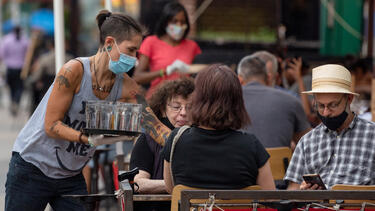Will COVID-19 Worsen Inequality in the United States?
The path of the pandemic has been shaped by inequality, with poor and minority workers experiencing greater exposure to infection and fewer health protections. Has the policy response helped ease these inequities—or made them worse? We asked Yale political scientist Jacob Hacker, the author, most recently, of Let Them Eat Tweets: How the Right Rules in an Age of Extreme Inequality.

Outdoor service at a restaurant in New York City on July 30, 2020. Photo: Alexi Rosenfeld/Getty Images.
How are the health effects of the COVID-19 pandemic shaped by inequality in the United States?
The COVID-19 pandemic has laid bare profound inequalities of class, ethnicity, and race. Exposure to the virus and the health protections that families enjoy are both deeply bound up with where they are on the economic ladder. Much of this is a legacy of America’s disjointed and incomplete safety net, which rests heavily on employment-based benefits. These benefits were always less available to poor and minority workers; they have been disappearing as unions lose ground and corporations “gigify” their workforces; and they’re useless when workers lose their jobs and hence lose their connection to valued workplace benefits.
What are the likely effects of the COVID-related recession on inequality in the short and long term?
In the short term, the crisis will surely exacerbate inequality. The pandemic has not just laid bare profound inequalities but also profound imbalances of power. Companies essentially got helicopter drops of cash from the Federal Reserve while ordinary workers relied on rickety unemployment insurance systems. Low-wage and frontline workers have had to put themselves at risk to stay afloat while those who do their work behind screens (like me) can shelter in place. If corporations are granted their demands for legal immunity when their workers get sick, these imbalances will only grow starker. However, these events have also increased the chance that there will be a serious electoral reversal in the fall and thus that steps will be taken, however halting, to push back.
What’s the right policy response to prevent inequality from worsening?
Extreme inequality is very hard to tackle. In the past, doing so has required major shifts in the balance of power and large-scale crises (especially, alas, large-scale military conflicts). But there are enormous differences across rich nations in the scale, character, and consequences of inequality. Ultimately, pushing back against America’s extreme inequality will require broadening the distribution of political power as well as the distribution of income and wealth. None of this will happen quickly or easily, but a combination of political reforms and popular economic measures to push back against inequality could start the process. Vicious cycles need to become virtuous circles, in which citizens come to see government as more responsive to their priorities and our democracy works to reward political leaders who embrace those priorities. Much hangs in the balance.